List of English words of Sanskrit origin – Part 4 of Part 7 | English words originated (derived) from Sanskrit | List of English words taken from Sanskrit | List of English corrupted words taken from Sanskrit
Namaste friends, how are you doing today? Welcome to #BhagavanBhakthi website / blog.
Bhagavan Lord Sri Krishna (Vishnu) (Rama) blessings to you and your family!
In this website / blog, you will always learn about #Hinduism #Sanskrit language.
Also subscribe to my YouTube channel from this link #BhagavanBhakthi to view videos about #Hinduism #Sanskrit language.
Just before going to “List of English words of Sanskrit origin – Part 4 of Part 7 | English words originated (derived) from Sanskrit | List of English words taken from Sanskrit | List of English corrupted words taken from Sanskrit“, let us know a brief, basic and very important information.
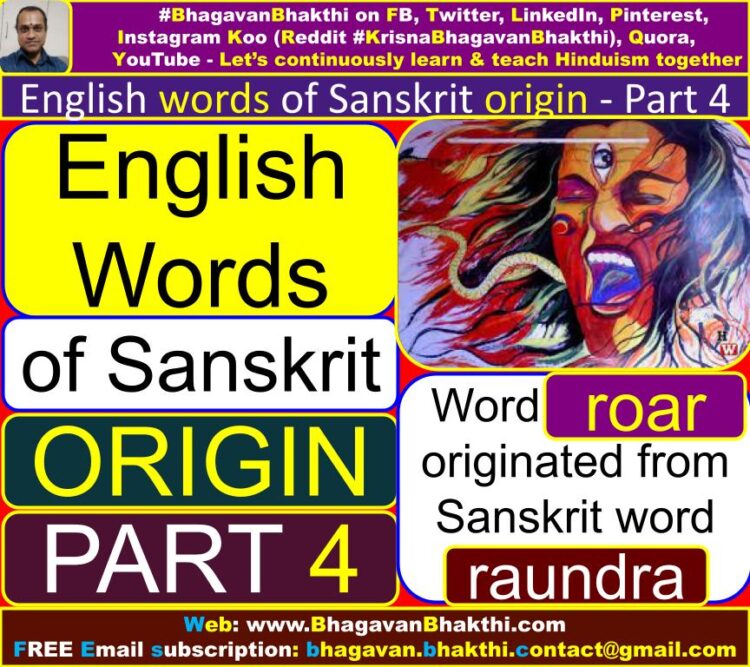
In post your will know about these : List of English words of Sanskrit origin, List of English words derived from Sanskrit, List of English words taken from Sanskrit, List of English corrupted words taken from Sanskrit, etc.
List of English words of Sanskrit origin (Part 4 of Part 7) are as given below:
Mount : In Sanskrit we have a word called ‘meru parvata’. This ‘meru‘ is a great and huge mountain where heavenly bodies exist. From the Sanskrit word ‘meru‘ the English word ‘mount / mountain’ came into existence. Translations (mountain) French: mont German: Berg Italian: monte Portuguese: monte Russian: Гора Spanish: monte.
Harm / hurt : English word(s) harm / hurt is been originated from the Sanskrit word ‘himsa‘. Wish : In Sanskrit ‘vivakSA / vivakS’ (read as vivakshaa / vivaksh) means wish. Another word for wish in Sanskrit is ‘icchaa’.
Former : In Sanskrit ‘purva / purv’ means former. Let us understand the similarity of both English and Samskruta words. The Sanskrit word purva = pur + va = fur + va = for + ma = former. Pronunciation difference. Translations (previous).
Extra : In Sanskrit ‘atirikta / atirikt’ means extra. If seen little closely we can understand the similarity. Translations (Beyond what is due, usual, expected, or necessary; additional; supernumerary) Italian: extra Spanish: exceso.
Status : In Sanskrit ‘stAnam / stAna / stAn’ (read as staanam / staana / staan) means status. Another meaning of stAna in Sanskrit is place. Translations (a person’s position or standing relative to that of others) German: Status Italian: stato Portuguese: estatuto Russian: положение.
Roar : In Sanskrit roar means ‘raudra‘. When Lord Shiva was born, he made this ‘raudra’ sound and thus he is known as Rudra. Translations (of animals) French: rugir German: brüllen Italian: ruggito, ruggire Portuguese: uivar, rugir Russian: рычать Spanish: rugir, bramar.
Thunder : In Sanskrit ‘tanyatu / tanyat’ means thunder. Translations (sound caused by a lightning). French: tonnerre German: Donner Italian: tuono Portuguese: trovão Russian: гром Spanish: trueno
Wind : In Sanskrit ‘vAta / vAt’ (read as vaata / vaat) means wind. Also wind means ‘vAyu’ (read as vaayu). Looking at these two Sankskri words it is clear the English word is stolen. Translations (movement of air).
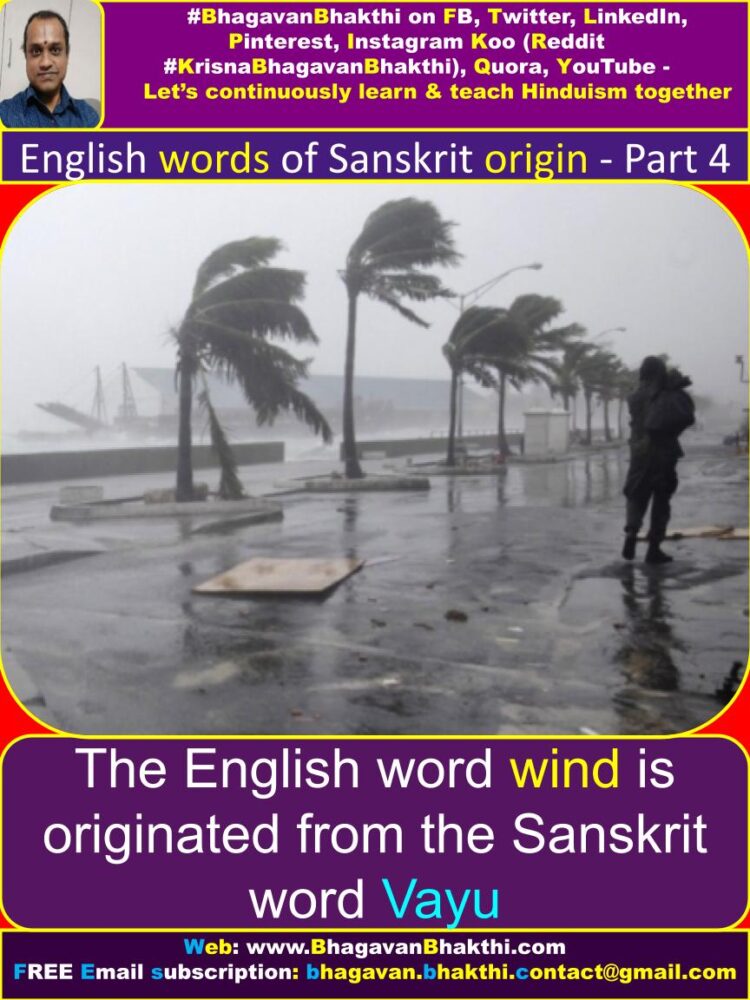
Need : In Sanskrit ‘nadhita / nadhit / ‘ means need. Translations (something needed). French: besoin, nécessité German: Notwendigkeit, Bedarf, Bedürfnis Italian: bisogno Portuguese: necessidade Russian: нужда Spanish: necesidad, necesidades.
Absent: In Sanskrit ‘anupastiti‘ means absent. Absent is the short form of the Sanskrit word. Translations (being away from a place). Swell / swelling : ‘suzizvi / suziz ‘ (read as sushishvi / sushish) means swelling in Sanskrit.
Doubt / Dilemma / Duality : All these English words has almost the same meaning. In Sanskrit ‘dvandva / dvaidhI / dvaidha‘ all has the same meaning and is similar to the former English words.
Double : In Sanskrit ‘dvaita / dvi / dvigunA‘ means double. Translations (Made up of two matching or complementary elements). German: doppelt Italian: doppio, doppia Portuguese: duplo Russian: двойной Spanish: doble.
Full : In Sanskrit full means ‘pUrna / pUrn’ (read as poorna / poorn). Here pUrn = poor + n = foor + n = full. Translations (containing the maximum possible amount) French: plein German: voll Italian: pieno Portuguese: cheio Russian: полный Spanish: lleno pronounciation.
Store / stored : In Sanskrit ‘sthApita / sthApit’ (read as sthaapita / sthaapit) means to store something. Translations (place where items may be kept) French: entrepôt German: Lager, Speicher Italian: magazzino, deposito Portuguese: depósito Russian: склад Spanish: depósito.
Surrender : In Sanksrit we have a beautiful word called ‘sharana / sharan’ which means surrender. The Sanskrit word ‘sharanagati’ is usually used for to surrender to the Supreme. Sharanu Sharanu Sri Hari / Rama / Krishna namo namaha.
Drop : In Sanskrit ‘drapsa’ means drop. Penis : In Sanskrit ‘piNDika‘ (read as pinnddhika) means penis. Translations (male organ for copulation and urination). French: pénis, bite, membre German: Penis, Glied, Schwanz (slang)
Italian: pene Portuguese: pénis (Portugal), pênis ( Brazil), membro, membro viril Russian: половой член Spanish: (Spain) pene, carajo, pirula, pirulo, pito, polla, (Colombia) pija, ( Bolivia) tranca, (Argentina) verga, chota, garompa, pipe, poste, poronga, papirola, miembro
Red : In Sanskrit red means ‘rakta / rakt’ (rakta varna – red color). Translations (having red as its colour). French: rouge German: rot Italian: rosso, rubino Portuguese: vermelho, rubro, rufo, rúbeo, rubente, rúbido, rússeo, ruge, escarlate, rubicundo Russian: красный Spanish: rojo, colorado, rubicundo, rubro, rufo, rúbeo.
Wild : In Sanskrit wild means ‘vanya‘. If wild is rewritten it will be waild or vaild. (Not sure why English language doesn’t use correct spelling). Wild is taken from Sanskrit language. Translations (not domesticated or tamed) French:sauvage German: wild Italian: selvaggio, selvatico Portuguese: selvagem, silvestre Russian: дикий Spanish: salvaje, montaraz.
Dust : In Sanskrit ‘dhUli / dhUl’ (read as dhuuli / dhuul) means dust. Grasp : In Sanskrit ‘grahaNa‘ (read as grahanha) means grasp. Another meaning of ‘grahaNa’ in Sanskrit is eclipse. Next : In Sanskrit next means ‘nantaram / nantara / nantar’.
Translations (following in a sequence) French: prochain, suivant German: nächster Italian: seguente, successivo, prossimo Portuguese: próximo, seguinte Russian: следующий Spanish: siguiente, próximo.
Near : ‘nikaTa / nikaT’ is the Sanskrit word for this. Carry : In Sanskrit ‘kalayati / kalaya / kala / kal’ means carry. Translations (to transport by lifting).
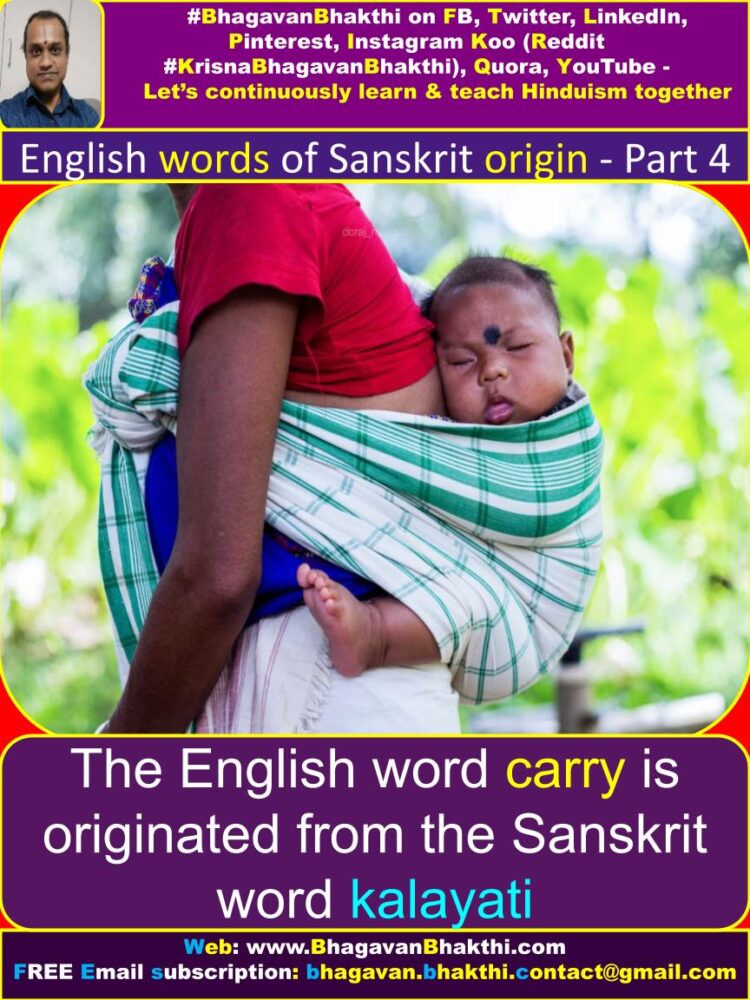
Count : ‘kolati / kolat’ means count in Sanskrit Translations (the act of counting). French: compte, décompte German: zählen Portuguese: contar Russian: счёт. Other : In Sanskrit other means ‘anya‘. If we write other in Sanskrit style, then the spelling would be ‘adar’.
That’s the difference between Sanskrit & other Indian languages and English & other languages. Translations (not the one) French: autre German: andere Italian: altro Portuguese: outro, outra Russian: другой Spanish: otro, otra, otros, otras.
Wool : In Sanskrit wool means ‘UrNa / UrN’ (read as oornha / oornh). If we write the wool in Sanskrit style then it would look like ‘ool’. Translations (hair of sheep, etc.) French: laine German: Wolle Italian: lana Portuguese: lã Russian: шерсть Spanish: lana.
Murmur : In Sanskrit ‘marmara / marmar’ means murmur. We should keep in mind that in Sanskrit if we tell ‘ma’, it will be ‘ma’ only. Translations (low sounds or speech) French: murmure, rumeur German: Gemurmel, Murmeln Russian: бормотание.
Child : In Sanskrit ‘zizu‘ (read as shishu) means child. Let us understand the similarity of both words. In English child = chi + l + d = chi + la + da. Here chi looks like shi. Baby : In Sanskrit ‘bAlaka / bAlak’ means baby.
Translations (very young human being) French: bébé German: Baby, Säugling, Kleinkind Italian: bambino, bambina, bimbo, bimba, bebè Portuguese: bebé (Portugal), bebê ( Brazil), nenê Russian: младенец Spanish: bebé, nene, niño, niña, bebe ( Argentina), guagua (Bolivia).
Boy : This word too has been derived from the Samskruta word ‘bAlaka / bAlak / bAla / bAl. Boycott : ‘bahiSkAra / bahiSkAr’ (read as bahishkaara / bahishkaar) is the Sanskrit. Translations (to abstain from dealing with a person or organisation as a protest) French: boycotter German: boykottieren Portuguese: boicotar Russian: бойкотировать Spanish: boicotear.
Strike : ‘znathati / znath’ (read as shnathati / shnathat) means strike in Sanskrit. Take strike = st + ri + ke = sta + rai + ka = shna + tai + ka = shna + tha + ta = shnathata / shnathat. Pierce : In Sanskrit ‘prachhida / prachhid’ means pierce something.
Translations (puncture) French: percer German: durchstechen Italian: pungere Portuguese: furar, perfurar Russian: протыкать Spanish: perforar.
Rend : ‘radati / rad’ means rend in Sanskrit. Bite : In Sanskrit ‘bhakshana / bhakshan / bhaksh’ means bite. If we write the English word bite in Sanskrit, it would look like ‘bait’. Berry : In Sanskrit ‘badari‘ (badri) means berry. Translations (small fruit). French: baie German: Beere Italian: bacca, coccola Portuguese: baga Russian: ягода Spanish: baya.
Strength : In Sanskrit ‘zakthi‘ (read as shakthi) means strength. We should always remember all words doesn’t match exactly. Globe : ‘glau or gola‘ means globe in Sanskrit. From this Sanskrit word we can easily understand that India was knowing about the earth / globe much before then any other country.
Here the Sanskrit word is by itself is explaining that our earth is not flat and in round / oval in shape. Translations (model of Earth) French: globe German: Globus Italian: globo Russian: глобус Spanish: globo.
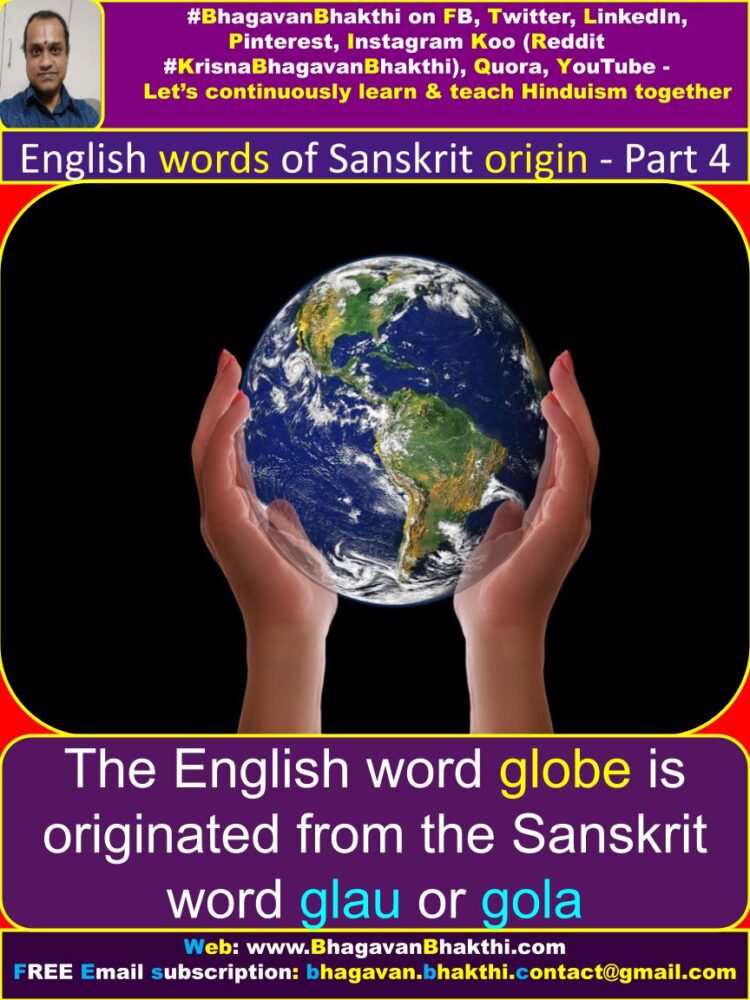
Vigorous : In Sanskrit ‘vigara / vigra’ means vigorous. Translations (Physically strong and active) Italian: vigoroso Portuguese: vigoroso Russian: сильный Spanish: vigoroso. Cave : ‘kandarA‘ (read as kandaraa means cave in Sanskrit. Cave is the short form of the Sanskrit word.
Translations (large, naturally occurring cavity formed underground) French: caverne, grotte German: Höhle Italian: caverna, grotta Portuguese: caverna Russian: пещера Spanish: cueva.
Statue : In Sanskrit ‘Sthaapita‘ means which is standing like a statue. Steady : In Sanskrit ‘sthira / sthir’ means steady. Translations (smooth and not bumpy or with obstructions) French: lisse German: stetig Russian: устойчивый Spanish: liso.
Ground : In Sanskrit ‘ghRSTa / ghRST’ (read as ghrishtta / ghrishtt) means ground. Script : In Sanskrit script means ‘smriti‘. We should remember the English word ‘manuscript’ is taken from ‘manusmriti’ of Sanskrit. Translations (writing; written document).
Nature : In Sanskrit ‘naisarga / nisarga / nisarg’ means nature. Translations (environment). French: nature German: Natur Italian: natura Portuguese: natureza Russian: природа Spanish: naturaleza.
Foster : In Sanskrit ‘pozana / pozan’ (read as poshana / poshan) means foster. Steel : In Sanskrit steel means ‘sAraloha / sAraloh’. We should remember in our early days itself we were using metals in our daily life in India.
Iron : In Sanskrit iron means ‘aya‘. Call : In Sanskrit ‘kadate / kad / klandati / kland’ means call. Shape : In Sanskrit ‘psu‘ (read as half pa and su = psu) means shape. Very difficult to pronounce for itself. Just imagine how an European would pronounce this.
Form (different form) : In Sanskrit form means ‘prakAra / prakAr’. We should note that wherever in Sanskrit ‘pa’ is used, their ‘fa’ is used in English. For example earlier we have seen for the Sanskrit word ‘pithru’, in English they pronounce it as ‘father’. Similarly here also for the Sanskrit word ‘prakAr’, the English have used ‘fa’, that is ‘form’.
Little difference will always be there. But definitely the English word ‘form’ is a corrupted version and short form of the Sanskrit word ‘prakAr’. Translations (shape or visible structure) French: forme German: Form Italian: forma Portuguese: forma Russian: форма Spanish: forma.
Sinew : In Sanskrit sinew means ‘snAyu‘ (read as snaayu). Translation ( (anatomy) A cord or tendon of the body). Cane : In Sanskrit ‘kaNDa / kaND’ means cane. Translations (slender flexible stem of plants such as bamboo). French: canne, tige German: Rohr Italian: canna, canna di bambu f, canna da zucchero Spanish: caña.
Bundle : In Sanskrit bundle means ‘bandhana / bandhan’. Translations (group of objects held together by wrapping or tying) German: Bündel Italian: insieme Portuguese: fardo Russian: связка Spanish: haz, atado, fajo.
Oriental : In Sanskrit oriental means ‘paurastya / udaya’. Another meaning of oriental is east. East is where the sun rises. paurya means pUrva, that is east in Sanskrit. Here paurya = orient. Translations (of or relating to the Orient or Asia, but most commonly to the Far East ) French: oriental German: orientalisch Russian: восточный.
Car / Cart : When Lord Sri Krishna was very young baby, He kills a demon who comes in the form of a cart. The demon’s name was ‘zakaTa‘ (read as shakata). Here zakaTa = za + kaTa = za + kart = za + cart = cart = car. This is the evolution of the words cart and car.
Cart: Translations (small, open, wheeled vehicle) French: chariot, charrette German: Wagen, Karren, Karren Russian: телега Spanish: carro, carreta. Car: translations (automobile, a vehicle steered by a driver)
French: voiture, auto, automobile, char ( Canada) German: Auto, Automobil, Wagen, PKW Italian: macchina, auto, automobile Portuguese: carro, viatura, automóvel. Russian: машина Spanish: coche (especially Mexico), automóvil (formal usage), auto ( especially Argentina) , carro (Caribbean Islands), máquina (Cuba).
Hero : In Sanskrit hero means ‘vIra‘ read as ‘viira / veera’. Europeans pronunciation differs with Samskruta language. Hero = heero = veero = veera = viira. Translations (person of great bravery) French: héros German: Held, Heldin Italian: eroe Portuguese: herói, heroína Russian: герой Spanish: héroe. Road: In Sanskrit ‘rathyA‘ means road.
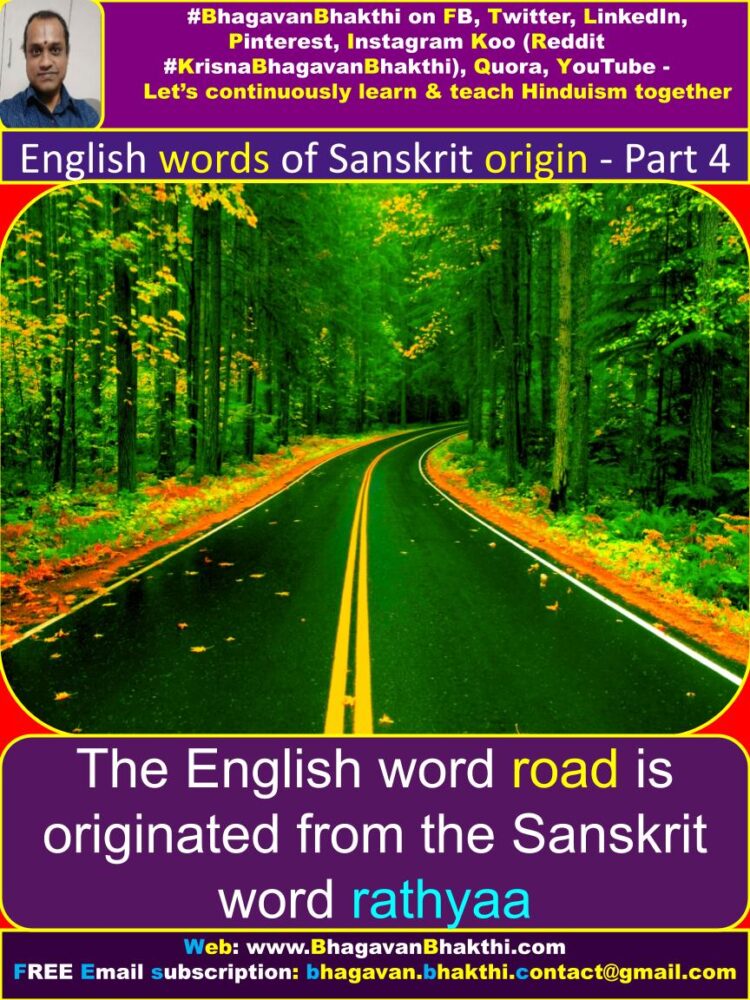
Way : In Sanskrit ‘vayuna‘ means way. Another Sanskrit word for way is ‘mArga’. Translations (wide path) French: voie, chemin German: Weg Italian: via Portuguese: caminho, via Russian: путь Spanish: camino, vía. House : In Sanskrit ‘AvAsa / AvAs’ means house.
Date : In Sanskrit day means ‘tithi or tith’. tith = date = deth. Translations (fruit of the date palm). French: datte German: Dattel Italian: dattero Portuguese: tâmara Russian: финик Spanish: dátil.
Foot : In Sanskrit foot means ‘pAda / pAd’. We should always remember that wherever ‘pa’ is used in Sanskrit, their ‘fa’ is used by Europeans. Example ‘pithru = father’. Translations (part of animal’s body). Ripe : In Sanskrit ‘riddha / riddh’ means ripe.
Dairy : Dairy is where all milk and products are used. In Sanskrit ‘dadhi’ means relating to milk and its byproducts. Made : In Sanskrit ‘mAta / mAt’ means made. In Sanskrit another meaning of ‘mAtA’ is mother. Both are different.
Mortuary : In Sanskrit ‘mrithyu‘ means mortuary. Translation (of, or relating to death or a funeral). Clay : In Sanskrit clay means ‘karda / kard’. Mud : In Sanskrit ‘mruttika‘ means mud. Mud = mruttika = mrutt = mud. Translation (mixture of soil and water).
Plunge : In Sanskrit ‘plavaga / plavag’ means plunge. Translations ((intransitive) to dive, leap or rush (into water or some liquid); to submerge one’s self) French: plonger Russian: нырять. Deep / Deeply : In Sanskrit ‘dIrgam / dIrga’ (read as deergham / deerga) means deep / deeply.
Shrub : In Sanskrit shrub means ‘kSupa / kSup’ (read as kshupa / kshup). Liable : In Sanskrit ‘lakSabhuta / lakSabhut’ (read as lakshyabhuta / lakshyabhut) means liable. Vocabulary : In Sanskrit ‘vAkshakti‘ means vocabulary.
Translations (list of words) French: vocabulaire German: Vokabeln, Wortschatz Italian: vocabolario Portuguese: vocabulário Russian: терминология Spanish: vocabulario.
Coward : In Sanskrit ‘kAkarava / kAkarav’ (read as kaakarava / kaakarav) means coward. Translations (a person who lacks courage) French: couard German: Feigling, (colloquial) Angsthase, (slang) Schisser, Schisserin, Hosenscheißer (colloquial) Italian: codardo, pusillanime, vigliacco, vile Portuguese: covarde Russian: трус Spanish: cobarde.
Each / Every : In Sanskrit ‘ekaika / ekaik’ means each. In Sanskrit ‘ek’ means one. Swallow : In Sanskrit ‘svAha / svAh’ (read as svaaha / svaah) means swallow. Main : In Sanskrit main means ‘mukhya‘. Little difference will always be there.
Meaning : In Sanskrit ‘marma / marm’ means meaning. Expect : In Sanskrit expect means ‘apeksha‘. Translations (To believe to be about to occur) French: attendre Portuguese: esperar Russian: надеяться. Asset : In Sanskrit asset means ‘sampatti / sampat’. Also it is known as aasti / asti.
Pay : In Sanskrit pay means ‘prayam / praya / pray’. Also in many north Indian languages ‘pagaar’ means pay. In many other Indian languages it is called as paavati also. Translations (to give money in exchange for goods or services) French: payer German: bezahlen, zahlen Italian: pagare Portuguese: pagar Russian: платить Spanish: pagar.
Paper : In Sanskrit paper means ‘pattra‘. Another means of pattra in Sanskrit is leaf. Translations (material for writing on) French: papier German: Papier Italian: carta Portuguese: papel Russian: бумага Spanish: papel.
Carbon : In Sanskrit carbon means ‘kaukiliiya‘. Translations (chemical element) French: carbone German: Kohlenstoff Italian: carbonio Portuguese: carbono Russian: углерод Spanish: carbono. Bake : In Sanskrit bake means ‘bhaksha / bhaksh’. Another meaning of bhaksh in Sanskrit is eat.
Shop : In Sanskrit shop means ‘shaala‘. Another meaning of shaala in Sanskrit is school. Wall : In Sanskrit wall means ‘vATa‘ (read as ‘vaatta’). Guard : In Sanskrit guard means ‘gopayate / gopaya’. Also gopayate means secret in Sanskrit.
Translations (person who or thing that protects something) French: garde German: Wächter Portuguese: guarda Russian: стражник Spanish: guarda, guardia.
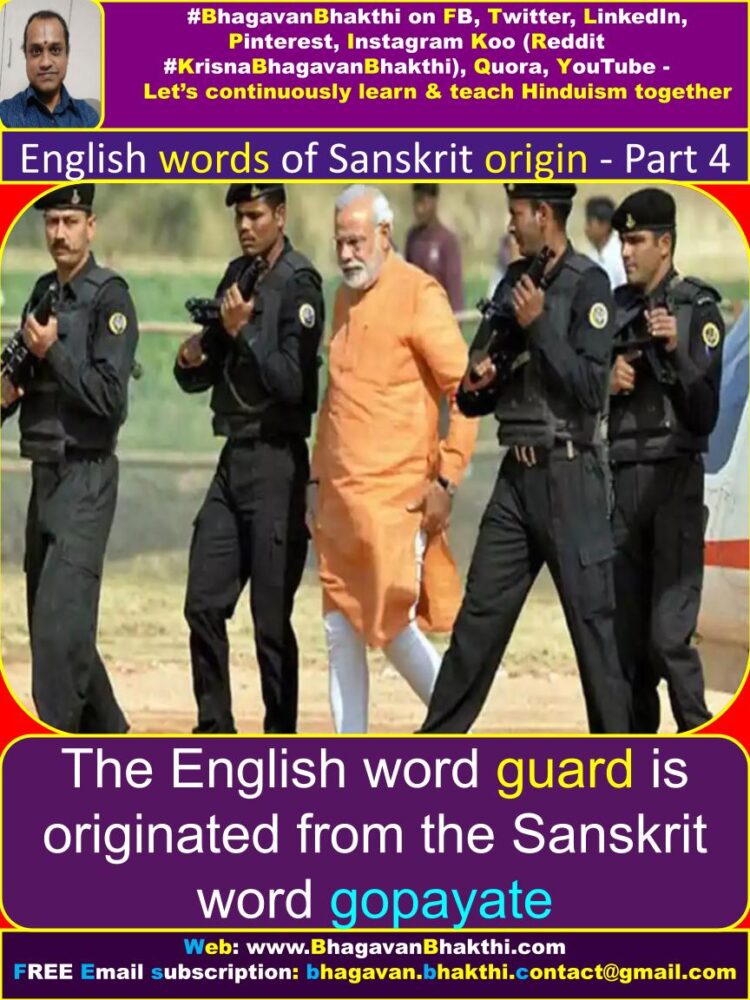
Abduct : In Sanksrit abduct means ‘apaharaNa‘. Translations (to draw away from its ordinary position) Italian: abdurre Portuguese: abduzir Spanish: abducir. Plumb / plumber : In Sanskrit ‘plamba / plumbakara’ means plumb / plumber.
Standard (example: in a school) : In Sanskrit standard means ‘stara‘. Translations (level of quality) French: standard German: Standard Italian: standard, livello, tenore Portuguese: padrão Russian: стандарт Spanish: estándar.
Secretion : In Sanskrit secretion means ‘strAva‘ (straava). Translations (secreted substance). Utter : In Sanskrit utter means ‘uchharana / uchharan / uchhar’. Veil : In Sanskrit veil means ‘varati / varata / varat’. Translations (something to hide an object ) French: voile Portuguese: véu Spanish: velo.
Prevent : In Sanskrit prevent means ‘prativArayati / prativAra / prativAr’. Lepidine : In Sanskrit lepidine means ‘lepa‘. Translation (aromatic organic compound used in the preparation of certain dyes). Chew : In Sanskrit chew means ‘charvati / charva / charv’.
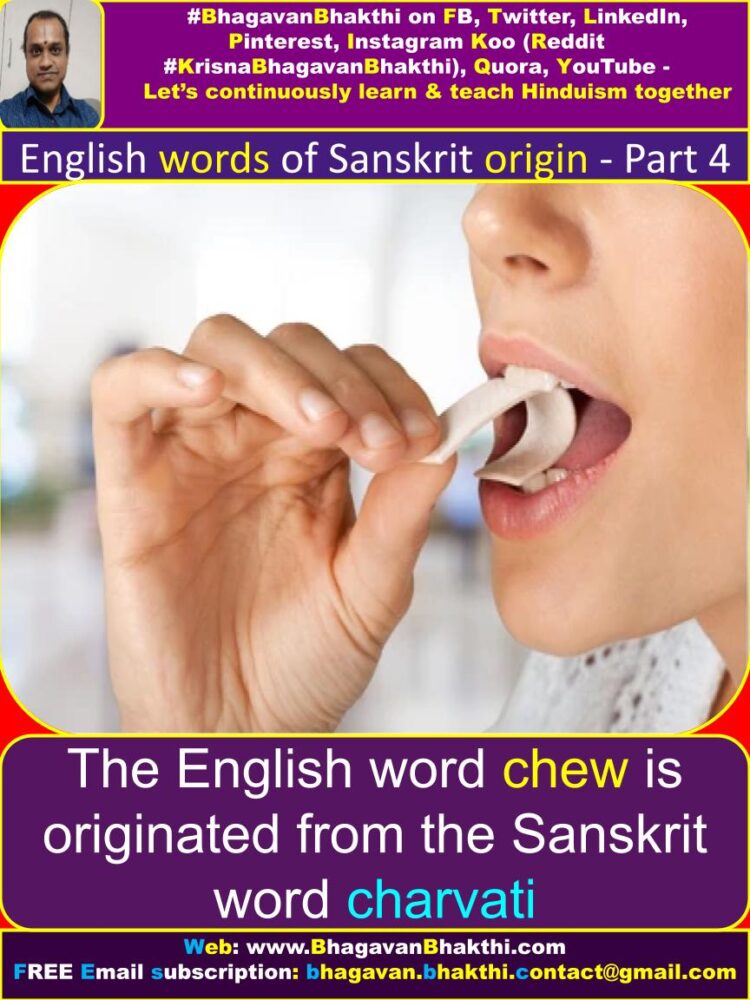
Piece : In Sanskrit piece means ‘pishita / pishit’. Translations (part of a larger whole) French: morceau, part German: Stück Italian: pezzo, porzione Portuguese: peça Russian: кусок Spanish: pieza, pedazo.
Decay : In Sanskrit decay means ‘dIyate‘ (read as deeyate). Pass / passage : In Sanskrit pass / passage means ‘prasarati / prasarat / prasara / prasar’. Translations (move or be moved from one place to another) French: passer Italian: passare Russian: проходить Spanish: pasar.
Promise : In Sanskrit promise means ‘pramāṇaṁ‘. Also in Sanskrit promise means ‘vachanam’. Translations (to do someting without miss) French: vœu, promesse German: Versprechen Italian: promessa Portuguese: promessa Russian: обещание Spanish: promesa.
Vow : In Sanskrit vow means ‘vachanam / vachana’. Translations (A solemn promise to perform some act, or behave in a specified manner) French: voeu German: Gelübde, Schwur, Eid, Gelöbnis Portuguese: voto Russian: клятва Spanish: voto, manda, promesa
Proof / prove : In Sanskrit ‘pramaaNa / pramaaN’ or ‘purAva‘ means proof / prove. Translations (any effort, process, or operation designed to establish or discover a fact or truth) French: preuve German: Beweis Italian: prova Portuguese: prova Russian: доказательство Spanish: prueba.
Negative : In Sanskrit negative means ‘nakArAtmaka / nakArAtmak’. Please see the first four alphabets in Sanskrit word and match with English word. Nega = nakA. Translations (not positive or neutral. Incite : In Sanskrit incite means ‘iSNAti / iSNAt’ (read as ishNaati).
Translations (to rouse, stir up or excite) French: inciter German: anstacheln Portuguese: incitar, provocar Russian: подстрекать Spanish: amotinar.
Little : In Sanskrit little means ‘liTyati / liTya / liTy’. Generate : In Sanskrit generate means ‘janati‘. Translations (to bring into being) French: générer Spanish: generar. Produce : In Sanskrit produce means ‘prasUyate‘. Translations (to make or manufacture).
Arrive : In Sanskrit arrive means ‘AyAti‘ (read as aayaati). Load : In Sanskrit load means ‘lardayati / larda / lard’. Thread : In Sanskrit thread means ‘tantu / tanti‘. Technique / teknik : In Sanskrit technique / teknik means ‘tantra‘.
Translations (practical aspects of a given art) French: technique German: Technik Italian: tecnica Portuguese: técnica Russian: техника Spanish: técnica.
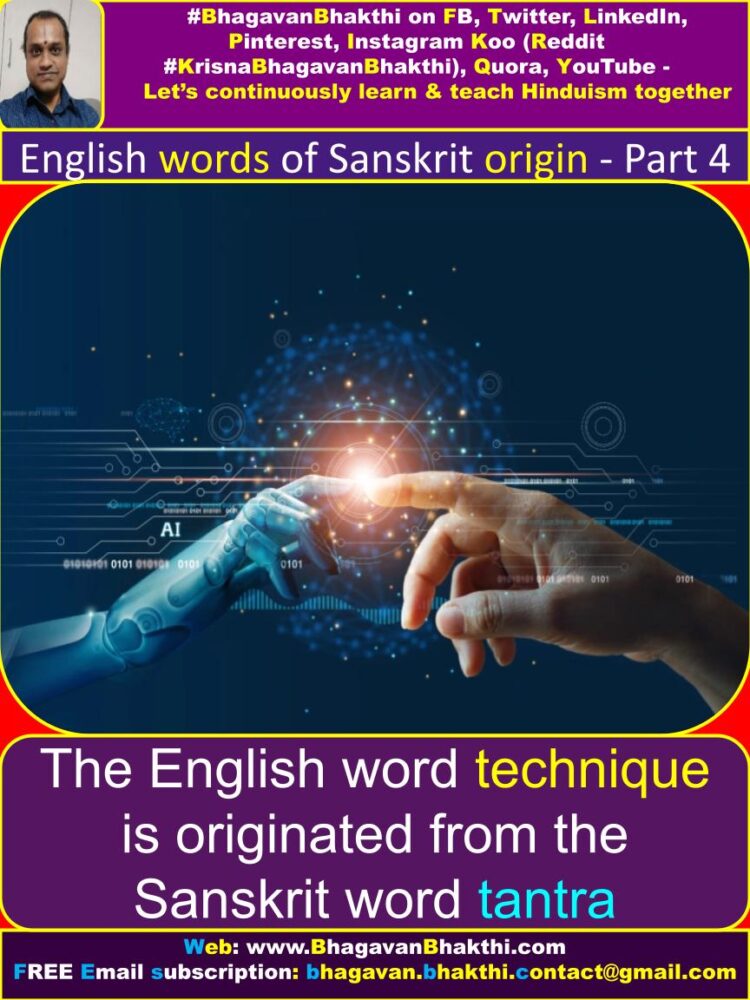
Their / Theirs : In Sanskrit their / theirs means ‘teSAm‘ (read as teshaam). Translations (that which belongs to them ) French: le leur, la leur, les leurs Italian: il loro, la loro, i loro, le loro Russian: их Spanish: suyo, suya, suyos, suyas.
Was : In Sanskrit ‘was’ means ‘vA‘ (read as ‘vaa’). Duplicate : In Sanskrit duplicate means ‘dvitakam‘. Translations (to make a copy of) French: copier, dupliquer German: vervielfältigen Italian: duplicare Russian: делать дубликат Spanish: duplicar.
Mete : In Sanskrit mete means ‘mAhate‘. (Translation) To measure. Thanks / thank you : In Sanskrit dhanyavAda / dhanyavAd means thanks / thank you. Here dhanyavAd = dhanya + vAd = dhan + ya + vAd = than + ya + vAd = thanks / thank you.
We all know Europeans can’t pronounce very deeply spelled alphabets / words. Pronouncing ‘tha’ is easier then ‘dha’. That’s the difference and secret of European languages.
Mercy : In Sanskrit mercy means ‘mArDIka‘ (read as maardhiika). Mercy is a simple form of ‘mArDIka’. Also in Sanskrit mercy means ‘dayA’. Translations (forgiveness or compassion) French: miséricorde German: Gnade Portuguese: misericórdia Russian: милосердие Spanish: piedad.
Hack / hacker (to kill) : In Sanskrit hack / hacker means ‘hantaka / hantak / hant’. Brilliant : In Sanskrit brilliant means ‘bhArUpa‘. We cannot expect all English words to be exactly as Sanskrit words. But definitely brilliant is taken from Sanskrit word. This is evolution pronunciation of English words.
Translations (shining brightly) French: brillant German: strahlend Italian: brillante Portuguese: brilhante Russian: блестящий Spanish: brillante.
Mark (to mark a boundary) : In Sanskrit mark means ‘maryA‘. Translations (indication for reference or measurement) French: marque, signe German: Zeichen Italian: segno Portuguese: marco Russian: знак Spanish: marca.
Market : In Sanskrit and many Indian languages market means ‘maharATa / maharAT / mharATa / mharAT / mAruvakaTTe. In Kannada market means ‘maruvakatta / maruvakatte‘.
Translations (spacious site for trading) French: marché German: Markt Portuguese: feira, mercado Russian: рынок Spanish: plaza mAruvakaTTe. Danger : In Sanskrit danger means ‘durgAha / durgA’. Many of us know Sri DurgA Devi is dangerous to inhuman people.

Place : In Sanskrit place means ‘pradeza‘ (read as pradesha). Pradeza = prade + za = plade + za = place.
Avenue : Avenue means a street, especially one bordered by trees. In Sanskrit ‘vanadhAra’ means avenue. Avenue = a + venue = a + vana. In Sanskrit ‘vana’ means a place with trees. That’s the secret. Translations (broad street with trees) French: avenue German: Allee Italian: viale, corso Portuguese: avenida Russian: авеню Spanish: avenida.
Tree : In Sanskrit tree means ‘taravaH‘. Tree is the short form of ‘taravaH’. Fresh : In Sanskrit fresh means ‘pratyagra‘. But one can ask what is the relationship between these two words. We should always remember that in English ‘fa’ is been used wherever ‘pa’ is used in Sanskrit.
For example father is ‘pithru’ in Sanskrit. Similarly ‘pratyagra’ = fresh. Fresh is the short form of the Sanskrit word. Translations (of produce, not from storage) French: frais, fraîche German: frisch Italian: fresco, fresca Portuguese: fresco Russian: свежий Spanish: fresco.
Pride : In Sanskrit pride means ‘pradarpa / pradarp’. Brave / bravo : In Sanskrit ‘bhadraka / bhadrak / bhadra’ means brave / bravo. Beauty : In Sanskrit beauty means ‘bhavya‘. Translations (quality of pleasing appearance) French: beauté German: Schönheit Italian: bellezza Portuguese: beleza Russian: красота Spanish: belleza.
Ivory : Ivory means an elephant with ivory teeth. In Sanskrit many of us may know that the elephant of Lord Sri Indra Deva is called ‘airAvata / airAvat’.
Variety : In Sanskrit ‘varNa / varN or vaividhya’ means variety. Translations (variation of something) French: variété German: Sorte Italian: varietà Russian: сорт Spanish: variedad.
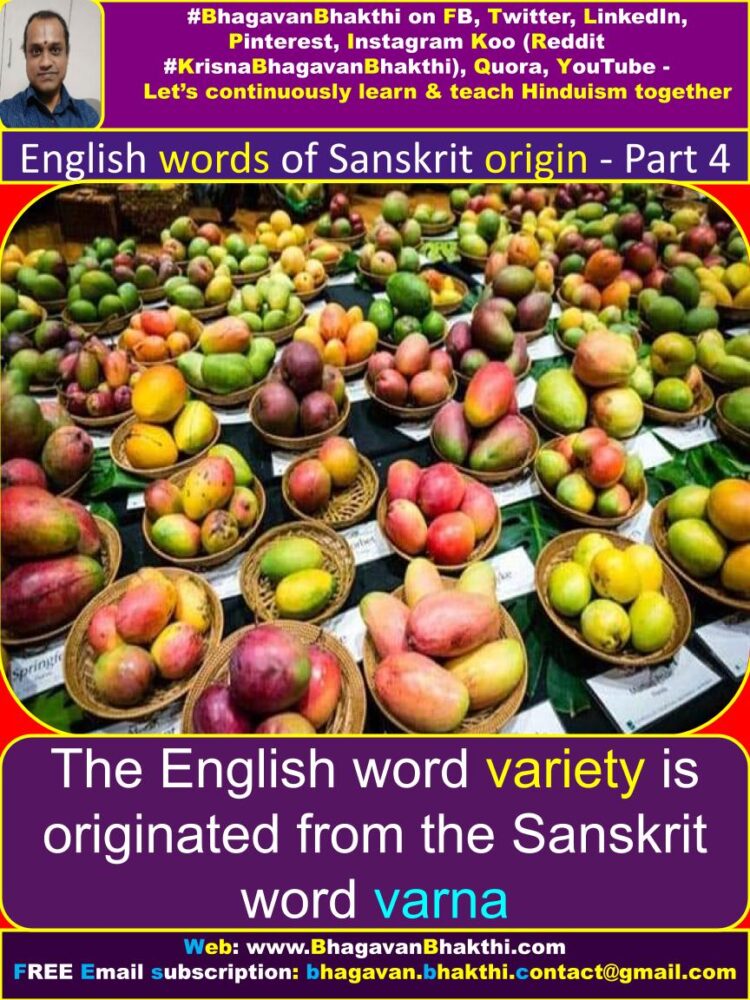
Indane : In Sanskrit indane means ‘indhana / indhan’. Many of us know ‘indhana / indhan’ is a kind of fuel. The English word ‘indane’ is also a kind of fuel, like ‘Indian Oil’ company have their gas product as ‘Indane gas’ of which many of us are customers and we use this gas in cooking purpose.
(organic compound) A bicyclic hydrocarbon consisting of a benzene ring fused to that of cyclopentane; it, and its derivatives, are found in petroleum.
Angle : In Sanskrit angle means ‘aGgula / aGgul’ (read as agnagula / agnagul) or simply ‘angula / angul’. In earlier days we were using our fingers to measure many things including angle(s). That’s why aGgul in form is angul (angul also means finger). Translations (geometrical figure) French: angle German: Winkel Italian: angolo Portuguese: ângulo Russian: угол Spanish: ángulo.
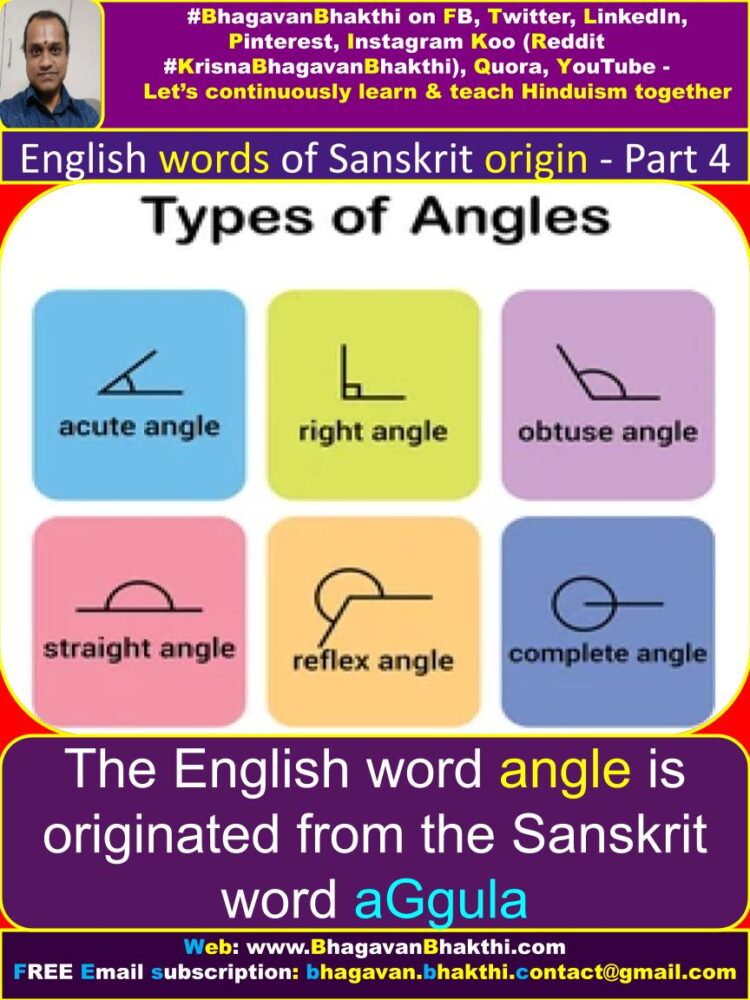
To watch videos on #Hinduism #Sanskrit language, SUBSCRIBE to my YouTube channel from this below link:
#BhagavanBhakthi YouTube channel
Continue reading to know about “List of English words originated from Sanskrit” from these below links:
List of English words of Sanskrit origin – Part 1 of Part 7
List of English words of Sanskrit origin – Part 2 of Part 7
List of English words of Sanskrit origin – Part 3 of Part 7
List of English words of Sanskrit origin – Part 5 of Part 7
Dear friends, if you need any clarifications about this post, kindly let me know, I will definitely try to answer all of them.
Also your one LIKE, one COMMENT, One Share, one SUBSCRIPTION is highly important.
This will help to know the quality of this content and also it will be helpful to know if any improvements is required for the content.
If you feel this content is useful to you and has helped you to improve your knowledge, kindly share this with your well-wishers.
Because “SHARING MEANS CARING”.
For receive FREE EMAIL SUBSCRIPTION about #BhagavanBhakthi, you can send an email to [email protected] from your email ID.
NAMASTE!
Sri Gurubhyo namaha
Om Sri Krishnaaya namaha
Sri Krishnaarpanamastu
Share in Social Media